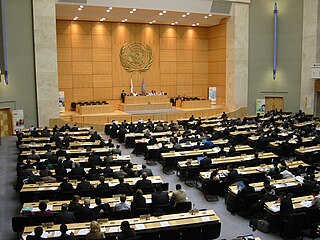
The United Nations Foundation is a charitable organization headquartered in Washington, DC, that supports the United Nations and its activities. It was established in 1998 with a $1 billion gift to the United Nations by philanthropist Ted Turner, who believed the UN was crucial for addressing the world's problems. Originally primarily a grantmaker, the UN Foundation has evolved into a strategic partner to the UN, mobilizing support to advance the Sustainable Development Goals (SDGs), and help the UN address issues such as climate change, global health, gender equality, human rights, data and technology, peace, and humanitarian responses. The UN Foundation's main work occurs through building public-private partnerships, communities, initiatives, campaigns, and alliances to broaden support for the UN and solve global problems. The UN Foundation has helped build awareness and advocate for action on, among others, antimicrobial resistance, regional action on climate change, local implementation of the SDGs, as well as global campaigns such as Nothing But Nets against malaria, the Measles & Rubella Initiative, the Clean Cooking Alliance, Girl Up, Shot@Life, and the Digital Impact Alliance, among others. In March 2020, the UN Foundation was also a key founder of the COVID-19 Solidarity Response Fund on behalf of the World Health Organization (WHO), helping to raise over $200 million USD within the first six weeks to support the global response to the COVID-19 pandemic.

The United Nations Economic Commission for Europe is one of the five regional commissions under the jurisdiction of the United Nations Economic and Social Council. It was established in order to promote economic cooperation and integration among its member states.

The World Summit on the Information Society (WSIS) was a two-phase United Nations-sponsored summit on information, communication and, in broad terms, the information society that took place in 2003 in Geneva and in 2005 in Tunis. WSIS Forums have taken place periodically since then. One of the Summit's chief aims is to bridge the global digital divide separating rich countries from poor countries by increasing internet accessibility in the developing world. The conferences established 17 May as World Information Society Day.
The Intergovernmental Oceanographic Commission of UNESCO (IOC/UNESCO) was established by resolution 2.31 adopted by the General Conference of the United Nations Educational, Scientific and Cultural Organization (UNESCO). It first met in Paris at UNESCO Headquarters from 19 to 27 October 1961. Initially, 40 States became members of the commission. The IOC assists governments to address their individual and collective ocean and coastal management needs, through the sharing of knowledge, information and technology as well as through the co-ordination of programs and building capacity in ocean and coastal research, observations and services.

The United Nations Information and Communication Technologies Task Force was a multi-stakeholder initiative associated with the United Nations which is "intended to lend a truly global dimension to the multitude of efforts to bridge the global digital divide, foster digital opportunity and thus firmly put ICT at the service of development for all".

The World Federation of United Nations Associations (WFUNA) was founded in 1946 as a Federation of national associations. Its objectives are to promote the values of the UN Charter, defend multilateralism, work towards a better United Nations Organisation and raise awareness on the main pillars of work of the United Nations—peace and security, sustainable development, and human rights.

The International Programme for the Development of Communication is a United Nations Educational, Scientific and Cultural Organization (UNESCO) programme aimed at strengthening the development of mass media in developing countries.
The United Nations Spatial Data Infrastructure (UNSDI) is an institutional and technical mechanism for establishing system coherence for the exchange and applications of geospatial data and information for UN activities and supporting SDI development activities in Member Countries.

The Centre for Policy Dialogue (CPD), established in 1993 by Rehman Sobhan, its Founder chairman, with support from leading civil society institutions in Bangladesh, is mandated by its Deed of Trust to service the growing demand originating from the emerging civil society of Bangladesh for a more participatory and accountable development process. CPD seeks to address this felt-need from the perspectives of marginalised stakeholders, by way of organising multistakeholder consultations, by conducting research on issues of critical national, regional and global interests, through dissemination of knowledge and information on key developmental issues, and by influencing the concerned policy making processes.

The United Nations Regional Information Centre (UNRIC) is one of 63 United Nations Information Centres (UNICs) around the world. Their main task is to spread the UN message, raise awareness and create understanding of issues relating to the United Nations' objectives. UNRIC serves the Western European Region by providing and disseminating UN information material, UN reports and documents, press kits, posters, fact sheets and brochures. The intention is to reach out to all segments of society and therefore the UNRIC Reference Library is open to all inquiries about the UN via telephone, e-mail and post. UN documents and publications are available in English, French and Spanish, but some material is also available in other European languages.

UN-SPIDER is a platform which facilitates the use of space-based technologies for disaster management and emergency response. It is a programme under the auspices of the United Nations Office for Outer Space Affairs (UNOOSA).

The United Nations Department of Global Communications (DGC) is a department of the Secretariat of the United Nations. It is tasked with raising public awareness and support of the work of the United Nations through strategic communications campaigns, media and relationships with civil society groups.

The Asia-Pacific Telecentre Network (APTN) is a collaborative initiative of the United Nations Economic and Social Commission for Asia and the Pacific (UN-ESCAP) and telecentre.org. The APTN Secretariat is hosted at ICT Agency of Sri Lanka (ICTA). APTN is dedicated to promote innovation and knowledge sharing amongst telecentres in the Asia-Pacific region where telecentres are growing exponentially each year. APTN is working towards creating a platform of networks of telecentres, to share experiences on issues of their interest and to cooperate on the development of solutions for common problems of the telecentres themselves in order to empower poor and disadvantaged communities with Information and Communication Technology (ICT) in the Asia Pacific Region. In other words, APTN will serve as the focal network or the knowledge hub for communication and information technology in the Asia Pacific region.
The United Nations Information Service at Geneva is part of a network of United Nations Information Centres across the world working to promote greater public understanding of the aims and activities of the United Nations.

Maher Nasser is the Director of the Outreach Division in the United Nations Department of Global Communications. He oversees varied communication initiatives and campaigns along with a number of partners, and supervises the library and bookshop. He also serves as Chairman of the Publications Board. He plays a key role in promoting the role of the UN in the world.
The United Nations Non-Governmental Liaison Service is a programme of the United Nations mandated to promote and develop constructive relations between the United Nations and civil society organizations. UN-NGLS operates autonomously across the United Nations system and with civil society constituencies and social movements on cross-cutting and emerging issues on the UN agenda. For example, UN-NGLS currently focuses on the UN General Assembly preparatory process for negotiations of a global compact on migration, and high-level events organized by the President of the UN General Assembly. UN-NGLS advises civil society organizations on opportunities to engage with the UN and facilitates their participation in various UN processes and events. UN-NGLS has offices at UN headquarters in New York and is part of the United Nations Department of Global Communications.

The Secretary-General's Envoy on Youth serves as a global advocate for addressing the needs and rights of young people for bringing the United Nations closer to them. The Envoy's Office is part of the United Nations Secretariat and supports multi-stakeholder partnerships related to the United Nations system-wide action plan on youth to volunteer initiatives. The office also promotes the empowerment and foster the leadership of youth at the national, regional, and global levels, including through exploring and encourages mechanisms for young people’s participation in the work of the United Nations and in political and economic processes with a special focus on the most marginalized and vulnerable youth.

The United Nations Information Centre for India and Bhutan is based in New Delhi, India. It is one of 63 United Nations Information Centres (UNICs) located worldwide.

The United Nations Information Center Washington is one of the United Nations Information Centers (UNICs) located in Washington, D.C. that provides service to the United States. UNIC Washington serves as the main point of contact for engagement between the United Nations and the United States Government, as well as American civil society, media, academia and youth.

The United Nations Information Center (UNIC) Tokyo, Japan, is based in Tokyo and it's a pivotal institution that serves as a communication arm of the United Nations. Established in April 1958, UNIC Tokyo has been operational for over 50 years, making it the only UNIC in Northeast Asia.











